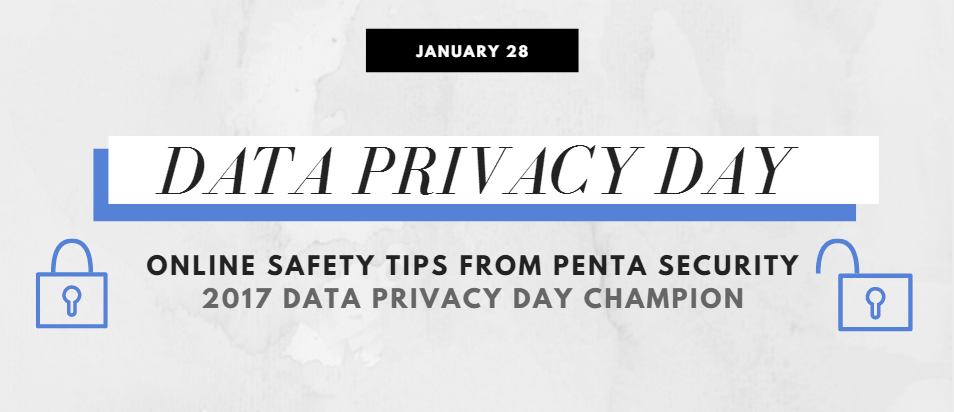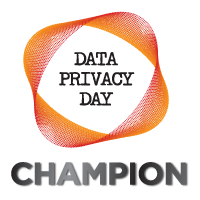Online Safety Tips from Penta Security, 2017 Data Privacy Day Champion

A Data Privacy Day Champion this year, Penta Security believes that organizations, businesses and governments are collectively responsible for being conscientious stewards of personal information. For Penta Security, this year marks two decades of experience in protecting an asset valued by all: personal data.
Data Privacy Day, held annually on January 28, is a worldwide effort to create awareness about the importance of privacy, safeguarding data and reminding organizations that privacy is good for business. Penta Security has consistently been committed to the cause by informing clients and the public about basic steps in protecting personal information, through security threat reports, eBooks, infographics, and other media.
To commemorate this significant day, here are Penta Security’s top five online safety tips for improving your data privacy efforts ahead of Data Privacy Day:
Change your passwords frequently
“The Most Common Passwords In 2016 Are Truly Terrible” by the Huffington Post reveals that despite living in era of cyber threats and data breaches, people are still resorting to using ‘123456’ or ‘password’ to keep guard of their personal data online. While it’s been mentioned repetitively, here is another reminder in enhancing your passwords (adding special characters are always a good idea) and to change them frequently, preferably once a year. Furthermore, it’s best to avoid using the same password for multiple accounts as this exposes you to a greater risk of data theft should one account be comprised. Lastly, consider enabling two-factor authentication as this adds an extra layer of protection to your personal accounts.
Recognize the signs of online phishing scams
Warding against phishing scams have come a long way, but many still fall prey to scams like the Nigerian prince email. With the right social engineering tactics, phishing scams can be convincing enough to solicit your personal information and, in a worst-case scenario, provide a gateway to your financial information. That’s why it’s extremely important to know the warning signs.
Avoid clicking on links within emails from unknown senders. Basic red flags include shortened links concealing their destination URL and website banner ads advertising too-good-to-be-true offers. Clicking on these will likely redirect you to a malicious site. Emails that impersonate major banking or retail corporations to ask for personal or financial information are commonplace these days. A good practice is to always enter a website address directly into your browser to avoid ending up on spoofed sites.
Be smart when using public Wi-Fi
Public Wi-Fi should be used with extra caution since cyber criminals can use unprotected Wi-Fi networks to sniff out private credentials and other sensitive data online. While it’s great that many restaurants, cafes, retail shops, and other public places offer free Wi-Fi, these hotspots could also serve as inlets for unauthorized monitoring of your private web activity. Public Wi-Fi should therefore be reserved for basic web surfing like reading the latest news or scrolling through social media feeds. Logging into your social media accounts, making online purchases, or doing online banking should only be done over a secured connection.
Don’t ignore your computer updates
Reminders to update your current operating system or software are critical in reducing the risk of exposing your data to cyber criminals. Developers often roll out new updates not just for improved functionality but also for urgent security updates and vulnerability patches. If automatic updates isn’t an option, setting up a regular schedule to scan through all your software and operating systems to check whether they are up-to-date will help you keep up good cyber hygiene.
Consider encrypting data that matters most to you
Data encryption is no longer reserved for the techies. If you have data that is highly sensitive, then consider encrypting it. Currently, there are many tools available online that can encrypt and decrypt files either for free or at a low cost. Encryption ensures that your data is only readable by the intended recipients. This is because data encryption utilizes special keys to algorithmically scramble and unscramble data so only you and whoever possesses the right keys can gain meaningful access to your data. We also recommend that you do not store encryption keys in the cloud and leave them in the possession of your cloud provider.
By participating in Data Privacy Day, Penta Security is joining the growing global effort among nonprofits, academic institutions, corporations, government entities and individuals to raise privacy awareness at home, at work and in communities. Penta Security seeks to help cultivate a greater prudence in data-handling by educating others about online safety through our blog, press releases, and other media. If you have extra tips to share with us, follow us on Twitter @pentasecsystems and send us a Tweet with the hashtag #PrivacyAware!
About Data Privacy Day
Data Privacy Day began in the United States and Canada in January 2008 as an extension of the Data Protection Day celebration in Europe. Data Protection Day commemorates the signing of Convention 108 on January 28 1981, the first legally binding international treaty dealing with privacy and data protection. The National Cyber Security Alliance, the nation’s leading nonprofit, public-private partnership promoting cybersecurity and privacy education and awareness, leads the effort in North America. The Data Privacy Day initiative is advised by a distinguished advisory committee of privacy professionals. For more information, visit https://staysafeonline.org/data-privacy-day/about.
